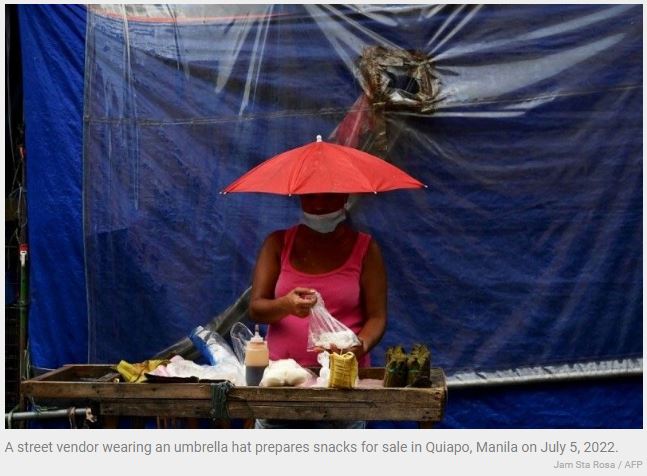Philippines – BSP: Inflation likely settled between 5.6-6.4% in July
MANILA, Philippines — The Bangko Sentral ng Pilipinas (BSP) said inflation likely settled between 5.6 percent and 6.4 percent in July, driven by the continued increase in food prices, further transport fare hikes, and depreciation of the peso.
According to the central bank, lower oil prices, reduction in electricity rates in areas serviced by Manila Electric Co. (Meralco), and lower pork prices are likely to temper in part the price pressures.
Inflation averaged 4.4 percent in the first half of the year, exceeding the BSP’s two to four percent target range. The consumer price index quickened to 6.1 percent, its highest level in almost four years, from 5.4 percent in May due to supply disruptions brought about by the Russia-Ukraine war as well as the COVID-19 lockdowns in China.
Inflation has been breaching the two to four percent target since April at 4.9 percent, May at 5.4 percent, and June at 6.1 percent.
Based on its assessment last June 23, the central bank’s Monetary Board raised its inflation forecasts to five percent instead of 4.6 percent and to 4.2 percent instead of 3.9 percent for 2023. For 2024, BSP expects inflation to average 3.3 percent.
BSP Governor Felipe Medalla told reporters Friday evening that authorities are still assessing whether or not to further revise its inflation forecast of five percent for 2022.
However, Medalla said the Monetary Board is likely to revised downwards its inflation projections for 2023 and 2024.
“(Our) forecast during the last meeting on inflation next year is 4.2 (percent). We’ll be revising that downwards. Similarly, our forecast in 2024 will also mostly likely be revised downwards,” Medalla said.
The BSP chief said the major contributors to inflation, particularly prices of oil and food, are going down.
“If they can have an agreement between Russia and Ukraine to not let the war disturb the supply, that is another plus,” Medalla said.
Looking ahead, the BSP said in a statement it would continue to monitor closely emerging price developments to enable timely intervention to arrest emergence of further second-round effects, consistent with BSP’s mandate of price and financial stability.
To curb rising inflationary pressures, the Monetary Board has so far raised key policy rates by 125 basis points, bringing the overnight reverse repurchase rate to 3.25 percent from two percent.
It started its interest rate liftoff after it delivered a 25-basis-point rate hike last May 19, the first in more than three years or since November 2018, followed by another 25 basis points last June 23.
During a surprise off-cycle meeting last July 14, the Monetary Board delivered a jumbo 75- basis-point rate hike to contain second round effects from rising wages and fare hikes from becoming more entrenched.
Medalla already signaled that monetary authorities are likely to deliver another rate increase ranging between 25 basis points and 50 basis points on Aug. 18 depending on the inflation outturn for July as well as the gross domestic product (GDP) growth for the second quarter of the year.
The BSP chief earlier ruled out another huge 75 basis points rate hike and a surprise off-cycle rate-setting meeting.
It said it was prepared to utilize the full force of available measures to manage the spillover effects of external developments including the decision of the US Federal Reserve to hike interest rates by another 75 basis points.
The aggressive rate hikes helped stabilize the peso as it strengthened back to the 55 to $1 level as it gained 69 centavos to close at 55.13 last Friday from Thursday’s 55.82.
Due to the hawkish US Fed and the strong demand for US dollars to pay for strong imports, the local currency depreciated by almost 10 percent as it touched the all-time low of 56.45 to $1, making its one of the worst performing currencies in the region.
Source: https://www.philstar.com/business/2022/07/31/2199102/bsp-inflation-likely-settled-between-56-64-july


 Thailand
Thailand




